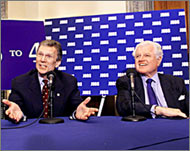Clark: Saddam not linked to 9/11
A leading US Democrat and presidential hopeful has said Saddam Hussein is not connected to the 11 September attacks.

Speaking in Dallas, Texas on Wednesday, Wesley Clark said the US president took the country to war for party-ideological reasons.
The former four star general accused George Bush of invading Iraq without adequate reason or justification. “I think it was a strategic mistake and wrong for America,” he said.
Clark added nothing said by the intelligence services to date had proven any connection between Saddam Hussein and the destruction of the World Trade Towers.
Contradiction?
Some believe his remarks contradicted previous comments he made to the New York Times in 2002, when he said there was a connection between Saddam Hussein and al-Qaida.
But Clark explained that statement was never an indication he believed Saddam was behind 9/11. However, in explaining himself he told reporters: “I do not believe that al-Qaida was involved in 9/11,” and he made the same remark later.
But as the news conference ended, an aide pulled the general aside and apparently informed him of his gaffe.
Returning to the lectern he said: “I misspoke… I meant to say that Saddam wasn’t linked to 9/11.”
 |
|
Kennedy (R) says Bush took |
More criticism
Meanwhile, Bush came in for more criticism from the US Senate’s leading liberal Democrat, who accused the White House of breaking faith with Americans by forcing them into an unnecessary war with Iraq.
In a speech to the Centre for American Progress, Senator Edward Kennedy of Massachusetts said on Wednesday President George Bush and his advisers capitalised on the fear created by the 11 September attacks.
The administration then put “a spin on the truth to justify a war that could well become one of the worst blunders in more than two centuries of American foreign policy.”
Fuelled by former Treasury Secretary Paul O’Neill’s similar attack on the government, Kennedy said “if Congress and the American people knew the whole truth, America never would have gone to war.”
Unfortunate consequences
The veteran politician claimed the administration “has broken faith with the American people, aided and abetted by a congressional majority willing to pursue ideology at any price – even the price of distorting the truth.”
He also said the Iraq war had made the effort to stop “terrorism” more difficult.
“We knocked al-Qaida down in the war in Afghanistan, but we let it regroup by going to war in Iraq,” he said of Usama bin Ladin’s network, blamed for the attacks on the United States.
Focusing on comments by Bush’s former treasury secretary, who said the president focused on ousting Saddam Hussein from his first days in office, Kennedy said O’Neill “revealed what many of us have long suspected”.
“Despite protestations to the contrary, the president and his senior aides began the march to war in Iraq in the earliest days of the administration.”
Troubled White House
O’Neill, ousted about a year ago in a shake-up of Bush’s economic team, has sparked a firestorm with interviews and contributions to a book depicting a disengaged president.
 |
|
Donald Rumsfeld denies any |
His comments also portrayed an administration bent on toppling the former Iraqi president long before Bush cited Iraq as a terrorist threat after the September 2001 attacks.
The White House has lashed out at O’Neill, launching an investigation on whether he disclosed secret documents.
Rumsfeld retort
Defence Secretary Donald Rumsfeld on Tuesday said the idea that Bush came to office “with a predisposition to invade Iraq… I think is a total misunderstanding of the situation.”
Bush decided to invade Iraq in March last year “after trying everything else in the world,” Rumsfeld said.
But Kennedy said the administration’s “agenda was clear: find a rationale to end Saddam’s regime,” and he said the White House timed its announcements on Iraq to influence 2002 congressional elections.
“War in Iraq was a war of choice, not a war of necessity. It was a product they were methodically rolling out,” he said.
Kennedy branded the administration as “breathtakingly arrogant,” convinced “they know what is in America’s interest, but they refuse to debate it honestly.”